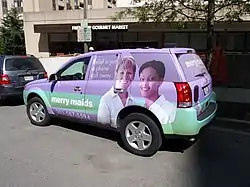Merry Maids
Merry Maids is an international franchisor which sells and supports residential cleaning services franchises throughout the United States, Canada and the United Kingdom.[1]: 298 [2]: 94 Merry Maids was founded in 1979, and was acquired by ServiceMaster in 1988.[1]: 298 [3]: 140 In 2007, the company had 1,400 independently owned and operated franchises worldwide and over 8,000 employees.[1]: 298
The Merry Maids logo | |
 A Merry Maids service vehicle | |
| Type | Subsidiary |
|---|---|
| Industry | Service |
| Founded | 1979 |
| Headquarters | Memphis, Tennessee |
Number of employees | 8,000+ (in 2007) |
| Parent | ServiceMaster |
| Website | merrymaids.com |
History
Labor relations
Several Merry Maids franchisees in the United States have been sued by their employees and by United States federal agencies for labor law violations.[5]: 219 In 2015, the United States Court of Appeals for the First Circuit upheld an unfair labor practice order issued by the National Labor Relations Board (NLRB) against a Merry Maids franchisee, Merry Maids of Boston, in a dispute over the right of a labor union to hold a union representation election among its employees. The First Circuit ruled that the NLRB had jurisdiction in the case, and rejected the franchisee's claim that the behavior of certain employees made a fair election impossible.[6]: 4 [5]: 219
Safety record
In 2015, Northampton's Merry Maids franchise was awarded a Governor’s Award for Safety Excellence by the U.S. state of Pennsylvania, with a record of no work-related injuries for over 1,580 days and no work-related fatalities in 23 years of operation.[7]: 31
References
- Rich, J.R. (2007). The unofficial guide to opening a franchise. Unofficial Guides. Wiley. p. 298. ISBN 978-0-470-13193-0.
- Ehrenreich, B.; Hochschild, A.R. (2004). Global woman: nannies, maids, and sex workers in the new economy. Henry Holt and Company. ISBN 978-1-4299-6305-3.
- Vanderkam, L. (2010). 168 hours: you have more time than you think. Penguin Publishing Group. ISBN 978-1-101-43294-5.
- Zook, C.; Allen, J. (2010). Profit from the core: a return to growth in turbulent times. Harvard Business Review Press. ISBN 978-1-4221-5713-8.
- Kurin, Jaclyn (2017). "A third way for applying U.S. labor laws to the online gig economy: using the franchise business model to regulate gig workers". Journal of Business and Technology Law. 12 (2, Art. 4): 193–226 – via University of Maryland Digital Commons.
- Anthony, William J.; Lewis, Jackson (n.d.). "Employment law update" (PDF). Association of Corporate Counsel. Archived (PDF) from the original on 2017-11-09. Retrieved 2017-11-09.
- Wolf, Tom; Manderino, Kathy M. (2015). Pennsylvania workers′ compensation and workplace safety 2015 annual report (PDF). Harrisburg, Pennsylvania, USA: Pennsylvania Department of Labor and Industry, Bureau of Workers’ Compensation. Archived (PDF) from the original on 2017-06-17. Retrieved 2017-11-09.